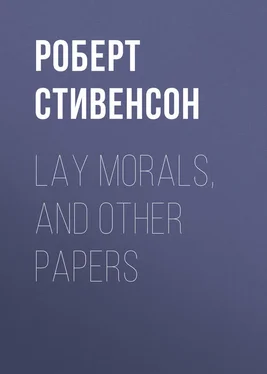Роберт Стивенсон - Lay Morals, and Other Papers
Здесь есть возможность читать онлайн «Роберт Стивенсон - Lay Morals, and Other Papers» — ознакомительный отрывок электронной книги совершенно бесплатно, а после прочтения отрывка купить полную версию. В некоторых случаях можно слушать аудио, скачать через торрент в формате fb2 и присутствует краткое содержание. Жанр: literature_19, foreign_antique, foreign_prose, essays, на английском языке. Описание произведения, (предисловие) а так же отзывы посетителей доступны на портале библиотеки ЛибКат.
- Название:Lay Morals, and Other Papers
- Автор:
- Жанр:
- Год:неизвестен
- ISBN:нет данных
- Рейтинг книги:3 / 5. Голосов: 1
-
Избранное:Добавить в избранное
- Отзывы:
-
Ваша оценка:
- 60
- 1
- 2
- 3
- 4
- 5
Lay Morals, and Other Papers: краткое содержание, описание и аннотация
Предлагаем к чтению аннотацию, описание, краткое содержание или предисловие (зависит от того, что написал сам автор книги «Lay Morals, and Other Papers»). Если вы не нашли необходимую информацию о книге — напишите в комментариях, мы постараемся отыскать её.
Lay Morals, and Other Papers — читать онлайн ознакомительный отрывок
Ниже представлен текст книги, разбитый по страницам. Система сохранения места последней прочитанной страницы, позволяет с удобством читать онлайн бесплатно книгу «Lay Morals, and Other Papers», без необходимости каждый раз заново искать на чём Вы остановились. Поставьте закладку, и сможете в любой момент перейти на страницу, на которой закончили чтение.
Интервал:
Закладка:
Robert Louis Stevenson
Lay Morals, and Other Papers
PREFACE
BY MRS. ROBERT LOUIS STEVENSON 1 1 With special reference to Father Damien , pp. 63–81.
In our long voyage on the yacht Casco , we visited many islands; I believe on every one we found the scourge of leprosy. In the Marquesas there was a regular leper settlement, though the persons living there seemed free to wander where they wished, fishing on the beach, or visiting friends in the villages. I remember one afternoon, at Anaho, when my husband and I, tired after a long quest for shells, sat down on the sand to rest awhile, a native man stepped out from under some cocoanut trees, regarding us hesitatingly as though fearful of intruding. My husband waved an invitation to the stranger to join us, offering his cigarette to the man in the island fashion. The cigarette was accepted and, after a puff or two, courteously passed back again according to native etiquette. The hand that held it was the maimed hand of a leper. To my consternation my husband took the cigarette and smoked it out. Afterwards when we were alone and I spoke of my horror he said, ‘I could not mortify the man. And if you think I liked doing it – that was another reason; because I didn’t want to.’
Another day, while we were still anchored in Anaho Bay, a messenger from round a distant headland came in a whale-boat with an urgent request that we go to see a young white girl who was ill with some mysterious malady. We had supposed that, with the beach-comber ‘Charley the red,’ we were the only white people on our side of the island. Though there was much wind that day and the sea ran high, we started at once, impelled partly by curiosity and partly by the pathetic nature of the message. Fortunately we took our luncheon with us, eating it on the beach before we went up to the house where the sick girl lay. Our hostess, the girl’s mother, met us with regrets that we had already lunched, saying, ‘I have a most excellent cook; here he is, now.’ She turned, as she spoke, to an elderly Chinaman who was plainly in an advanced stage of leprosy. When the man was gone, my husband asked if she had no fear of contagion. ‘I don’t believe in contagion,’ was her reply. But there was little doubt as to what ailed her daughter. She was certainly suffering from leprosy. We could only advise that the girl be taken to the French post at Santa Maria Bay where there was a doctor.
On our return to the Casco we confessed to each other with what alarm and repugnance we touched the miserable girl. We talked long that evening of Father Damien, his sublime heroism, and his martyrdom which was already nearing its sad end. Beyond all noble qualities my husband placed courage. The more he saw of leprosy, and he saw much in the islands, the higher rose his admiration for the simple priest of Molokai. ‘I must see Molokai,’ he said many times. ‘I must somehow manage to see Molokai.’
In January 1889, we arrived in Honolulu, settling in a pleasant cottage by the sea to rest until we were ready to return to England. The Casco we sent back to San Francisco with the captain. But the knowledge that every few days some vessel was leaving Honolulu to cruise among islands we had not seen, and now should never see, was more than we could bear. First we engaged passage on a missionary ship, but changed our minds – my husband would not be allowed to smoke on board, for one reason – and chartered the trading schooner Equator . This was thought too rough a voyage for my mother-in-law, as indeed it would have been; so she was sent, somewhat protesting, back to Scotland.
My husband was still intent on seeing Molokai. After the waste of much time and red tape, he finally received an official permission to visit the leper settlement. It did not occur to him it would be necessary to get a separate official permission to leave Molokai; hence he was nearly left behind when the vessel sailed out. He only saved himself by a prodigious leap which landed him on board the boat, whence nothing but force could dislodge him. By the doctor’s orders he took gloves to wear as a precautionary measure against contagion, but they were never worn. At first he avoided shaking hands, but when he played croquet with the young leper girls he would not listen to the Mother Superior’s warning that he must wear gloves. He thought it might remind them of their condition. ‘What will you do if you find you have contracted leprosy?’ I asked. ‘Do?’ he replied; ‘why, you and I would spend the rest of our lives in Molokai and become humble followers of Father Damien.’ As Mr. Balfour says in the Life of Stevenson, he was as stern with his family as he was with himself, and as exacting.
He talked very little to us of the tragedy of Molokai, though I could see it lay heavy on his spirits; but of the great work begun by Father Damien and carried on by his successors he spoke fully. He had followed the life of the priest like a detective until there seemed nothing more to learn. Mother Mary Ann, the Mother Superior, he could never mention without deep emotion. One of the first things he did on his return to Honolulu was to send her a grand piano for the use of her girls – the girls with whom he had played croquet. He also sent toys, sewing materials, small tools for the younger children, and other things that I have forgotten. After his death a letter was found among his papers, of which I have only the last few lines. ‘I cannot suppose you remember me, but I won’t forget you, nor God won’t forget you for your kindness to the blind white leper at Molokai.’
During my husband’s absence I had made every preparation for our voyage on the Equator , so but little time was lost before we found ourselves on board, our sails set for the south. The Equator , which had easily lived through the great Samoan hurricane, made no such phenomenal runs as the Casco , but we could trust her, and she had no ‘tricks and ways’ that we did not understand. We liked the sailors, we loved the ship and her captain, so it was with heart-felt regret we said farewell in the harbour of Apia after a long and perfect cruise.
After reading the letters that awaited us in Apia, we looked over the newspapers. Our indignation may be imagined when we read in one item that, owing to the publication of a letter by a well-known Honolulu missionary, depicting Father Damien as a dirty old peasant who had contracted leprosy through his immoral habits, the project to erect a monument to his memory would be abandoned. ‘I’ll not believe it,’ said my husband, ‘unless I see it with my own eyes; for it is too damnable for belief!’
But see it he did, in spite of his incredulity, for in Sydney, a month or two later, the very journal containing the letter condemnatory of Father Damien was among the first we chanced to open. I shall never forget my husband’s ferocity of indignation, his leaping stride as he paced the room holding the offending paper at arm’s-length before his eyes that burned and sparkled with a peculiar flashing light. His cousin Mr. Balfour, in his Life of Robert Louis Stevenson , says: ‘his eyes.. when he was moved to anger or any fierce emotion seemed literally to blaze and glow with a burning light.’ In another moment he disappeared through the doorway, and I could hear him, in his own room, pulling his chair to the table, and the sound of his inkstand being dragged towards him.
That afternoon he called us together – my son, my daughter, and myself – saying that he had something serious to lay before us. He went over the circumstances succinctly, and then we three had the incomparable experience of hearing its author read aloud the defence of Father Damien while it was still red-hot from his indignant soul.
Читать дальшеИнтервал:
Закладка:
Похожие книги на «Lay Morals, and Other Papers»
Представляем Вашему вниманию похожие книги на «Lay Morals, and Other Papers» списком для выбора. Мы отобрали схожую по названию и смыслу литературу в надежде предоставить читателям больше вариантов отыскать новые, интересные, ещё непрочитанные произведения.
Обсуждение, отзывы о книге «Lay Morals, and Other Papers» и просто собственные мнения читателей. Оставьте ваши комментарии, напишите, что Вы думаете о произведении, его смысле или главных героях. Укажите что конкретно понравилось, а что нет, и почему Вы так считаете.












